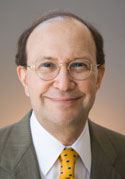BY PATRICK KURP
Which nations will best advance the interests of science and engineering, and thus reap the most economic benefits in the coming century?
“Those nations most willing to engage in patient, long-term investment — and that’s not necessarily the United States,” said William Press, chairman of the board and former president of the American Association for the Advancement of Science, at an April 4 lecture at Rice University. “I think China is very good at this. Europe is pretty good. The countries at risk are the U.S., Canada and Australia.”
Press, who since 2009 has sat on the President’s Council of Advisers on Science and Technology (PCAST), presented “What’s So Special About Science and How Much Should We Spend on It?” His talk was sponsored by Rice’s Ken Kennedy Institute for Information Technology and Baker Institute for Public Policy.
He noted that opinion polls in the U.S. regularly rank scientists in terms of public esteem with firefighters, doctors, nurses and military officers. “These are the most prestigious occupations. People understand that there’s a pragmatic benefit from science, that it improves their lives. We can use this public faith to help encourage long-range planning and investment,” he said.
Press holds the Warren J. and Viola M. Raymer Chair in Computer Sciences and Integrative Biology at the University of Texas at Austin. He urged renewed support for basic research and stronger ties between research universities and industry. “In difficult economic times, is science research the golden goose or just another pig at the trough? We need to encourage the sense of appropriability, that innovators and investors can profit from innovation,” he said.
In November, PCAST issued a report, “Transformation and Opportunity: The Future of the U.S. Research Enterprise,” suggesting a renewed national focus on basic research to sustain technological innovation and create additional jobs. Press, who co-chaired the PCAST working group, characterized the report as “a tough-love message.”
Press reviewed some of the report’s recommendations:
— Research and development expenditures (government and private) should grow moderately to 3 percent of gross domestic product from the current 2.9 percent.
— The Research and Experimentation Tax Credit should be made permanent.
— Eliminate regulations and policies that do not add value or enhance accountability, especially those that dampen the productivity of research universities.
— Undergraduate STEM (science, technology, engineering and mathematics) education should be improved through adoption of empirically validated best practices to attract and retain the most-qualified students.
— The U.S. must attract and retain for both universities and industry the world’s best researchers and students from abroad.
An audience member asked Press if a “Sputnik moment” might be required, and what such a moment might be, to spur the United States into a recommitment to long-term investments in science. Press said global climate change perhaps represents such an event, but added, “I’d hate to wish for a catastrophe.”
“We have to make rational choices about public investment in social capital that is long-tailed in time, and that has benefits that are not easily monetized. We can’t just be in it for the quick return on investment,” he said.
Press has published more than 150 papers in computational biology, theoretical astrophysics, cosmology and computational algorithms. He is senior author of the Numerical Recipes textbooks on scientific computing, of which there are more than 400,000 copies in print. Press was elected to the National Academy of Sciences (NAS) in 1994, and in 2000 became a founding member of the NAS Computer and Information Sciences section.
–Patrick Kurp is a science writer in the George R. Brown School of Engineering.



Leave a Reply